September 15
Quick breakfast at the hotel, then took the tube to the Bloomsbury Coffee House to meet Dayo Olopade and Walter Lamberson for breakfast. Dayo is the daughter of our friends, Funmi and Sola Olopade. Over a year ago, Carol and I attended the wedding of their daughter, Feyi, in Lagos, Nigeria.
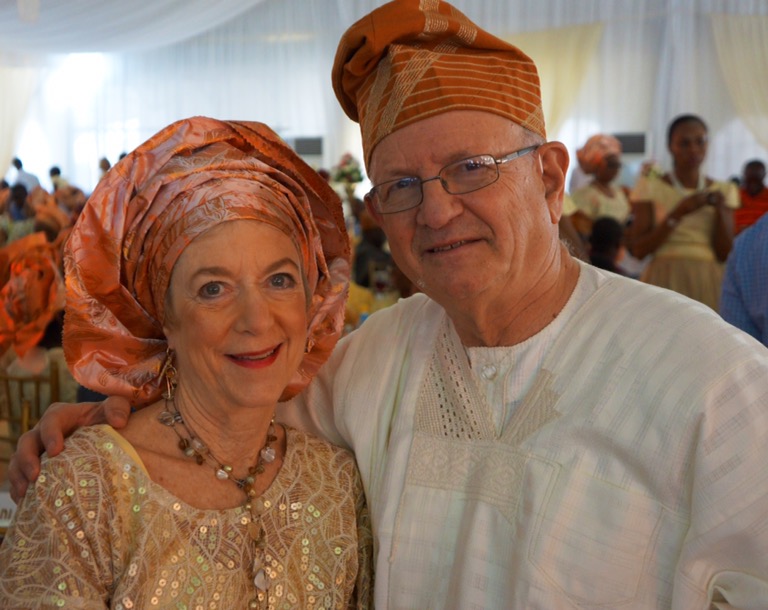
For Dayo and Walter’s wedding less than two weeks ago in Santa Fe, NM, we did not have to wear Nigerian dress.

Walter is currently attending business school in London, and Dayo is commuting from NY, where she works for Facebook, having obtained MBA and law degrees from Yale. Great to hear about Walter and Dayo’s hectic, exciting life, and it will be most interesting to see the course that the careers of these two highly-talented people take. (Dayo ran off to work before I realized that I hadn’t gotten her photo.)
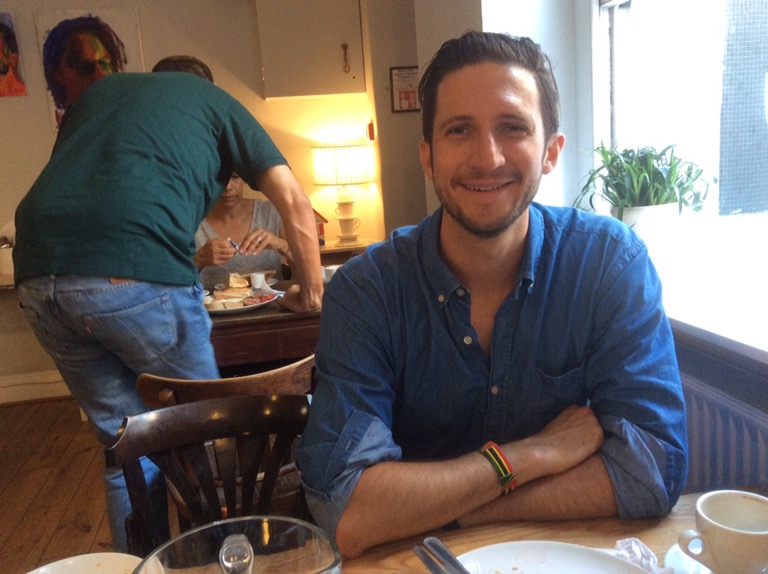
Carol and I lingered around the coffee house and then went to meet Tom Handler at he British Museum, where he was anxious to see an exhibit of newly-uncovered (underwater) artifacts from two cities, Thonis-Heracleion and Canopus, in the Nile Delta in Egypt. The former was an important trade hub and the latter a major religious center, particularly for Osiris, God of the afterlife. The exhibit artifacts date from the 7th century BC for several centuries and show Greek and Egyptian art and the influences between the two. Fantastic exhibit, both interesting and well put together, and an altogether amazing discovery that is less than 10% excavated at the moment. Here’s an artifact, and one of the divers who made the discovery.
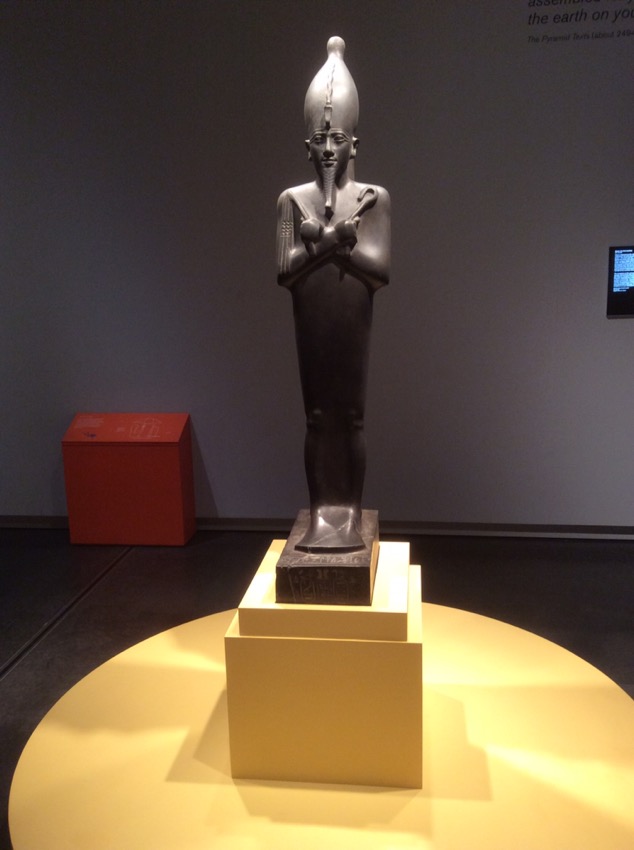 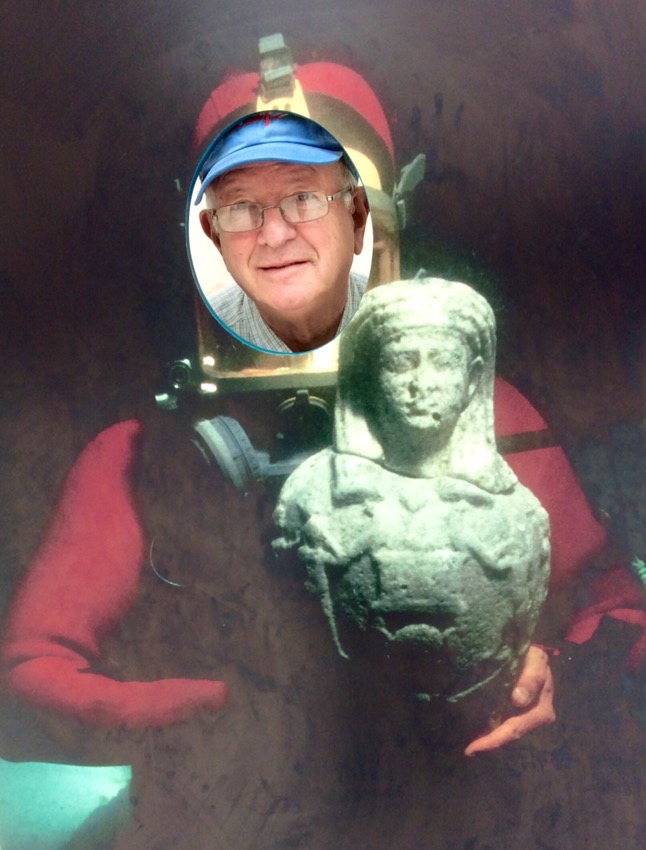
Lunch with Tom at the museum, then back to the Club to rest up before meeting Tom and Judith for dinner at a hotel, which was part of a 2-hour show based on the British comedy show, Faulty Towers. We knew going in that this would either be a lot of fun, or stupid. In fact, it turned out to be very entertaining and fun. Here are a few photos taken at the dinner.
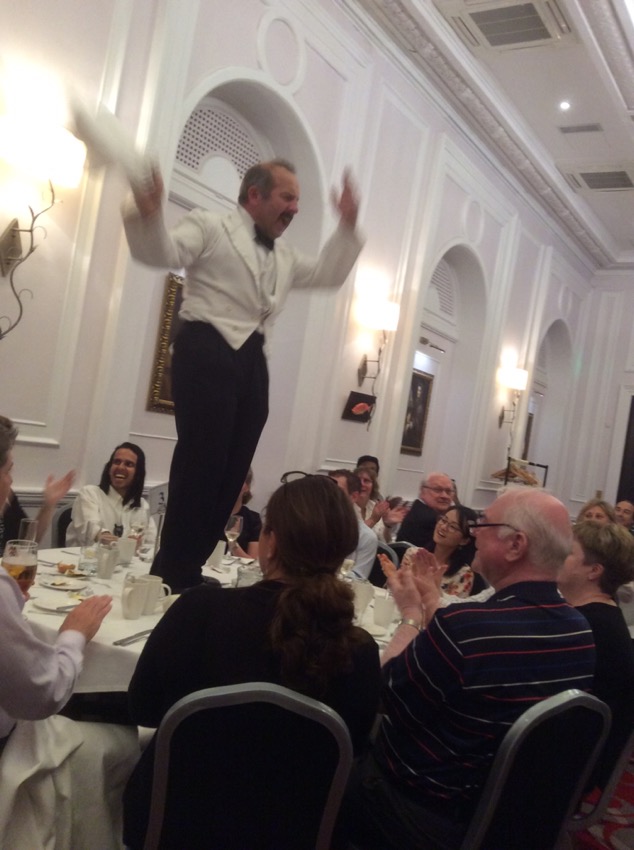  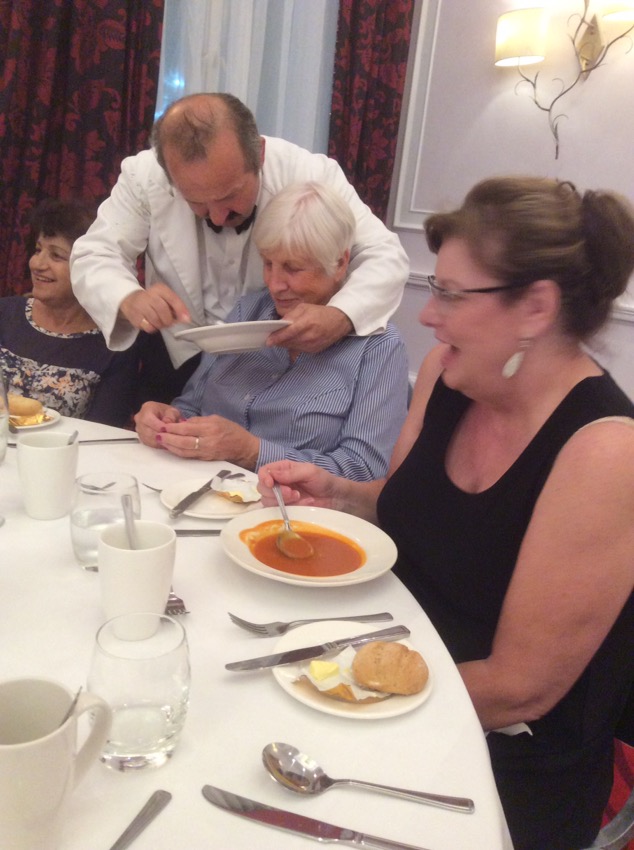
Took the tube home after dinner, blogged and retired.
September 14
Overslept, and didn’t arise until 10AM, thus missing the breakfast that came with the room. Damn.
On the last day of our trip to England with our daughters back in 1985, I found myself wandering through an area of art galleries alone. I saw a piece in the window that I liked a lot, so went in and asked the gallery owner whether she had any other paintings by the artist, John Edwards. She did not, but said that he lived not far and they could get other paintings in a couple of days, as they were about to open John’s first one-man show. When I said that that would not do us any good, she picked up the phone, called John and said we could go over to visit him and see his work in his studio/apartment.
So, I packed up Carol and the kids and we went to see John, who lived in a converted biscuit factory in Southeast London accessed through an old fashioned freight elevator. We hit it off with John, who is a very engaging and funny fellow, originally from Wales. He showed us a notebook of drawings he did when he was five, and he tries to duplicate some of that childlike quality in his work. Before we left his apartment, we had guaranteed the success of his first show, as we bought five paintings. We’ve stayed in touch with John, off and on, and saw him twice in Chicago, when he was over to show his work. Here is John and two photos of paintings we own by John. The first large piece, which was one of the pieces we bought when we first met John, hangs in our living room and the smaller, red still life, bought later, hangs outside our kitchen.
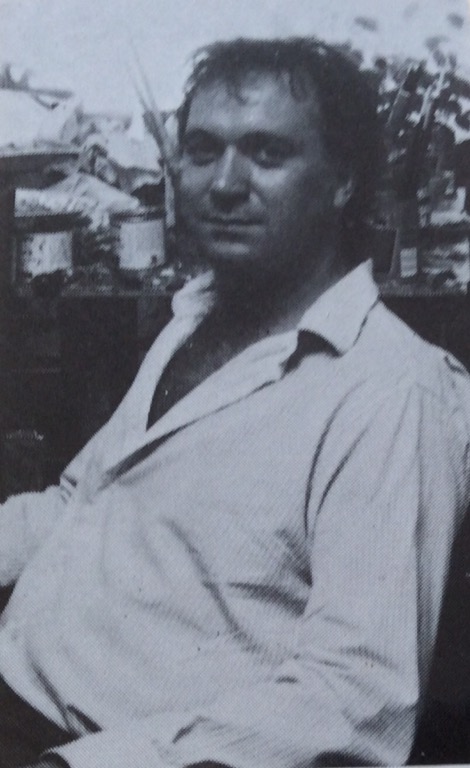 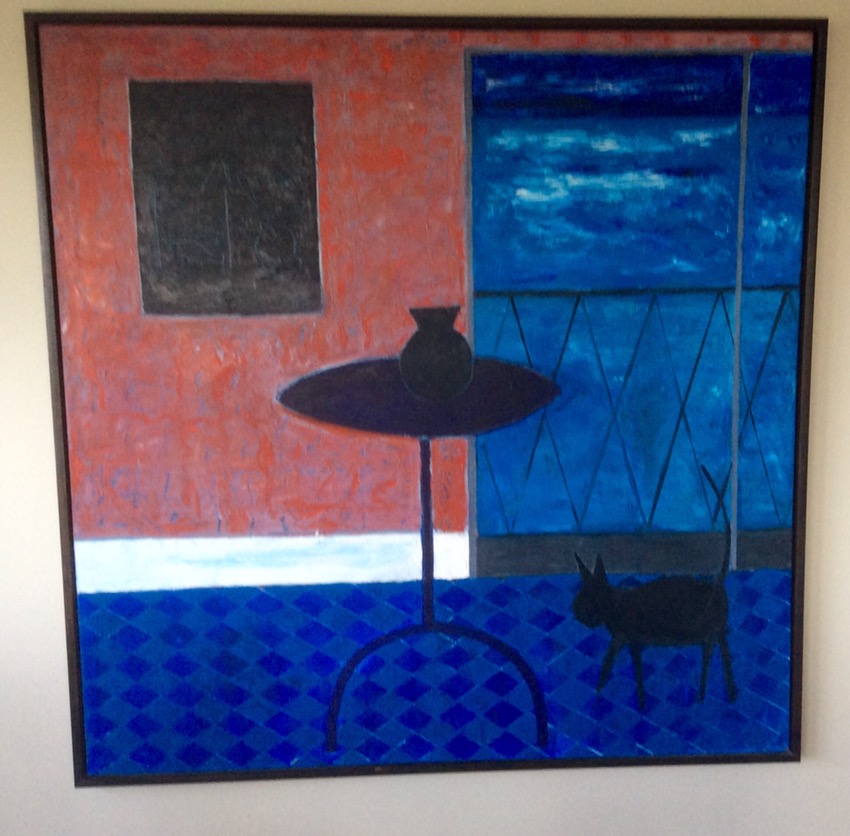 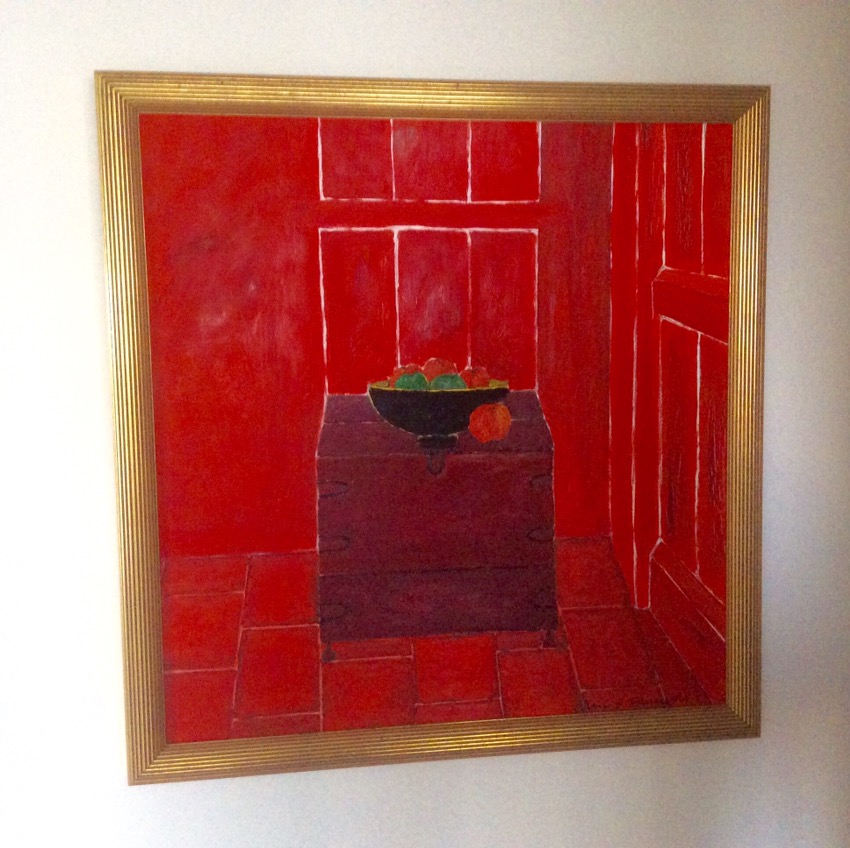
We had arranged to meet John at The Sloane Club at 11. John has been through a lot since we first knew him, including a divorce and two quite serious bouts with cancer. While he, like we, looks 30 years older, as we began to talk, it was clear that his former spirit and sense of humor had survive in tack. For the first time in well over a decade John felt healthy. We talked about what he’d been through, which he wrote about in his book, How Cancer Saved My Life. He speaks widely on creativity and illness, is involved in public arts projects, such as murals, is a consultant to a large estate in LA regarding the valuation and sale of their art holdings and continues to paint himself, as he arises at 4 each morning. As our discussion ranged widely, first over coffee and then over lunch, we felt fully reconnected with John and his life. After about three hours, John needed to take off for a meeting with a publisher that will be doing the new book that he is working on.
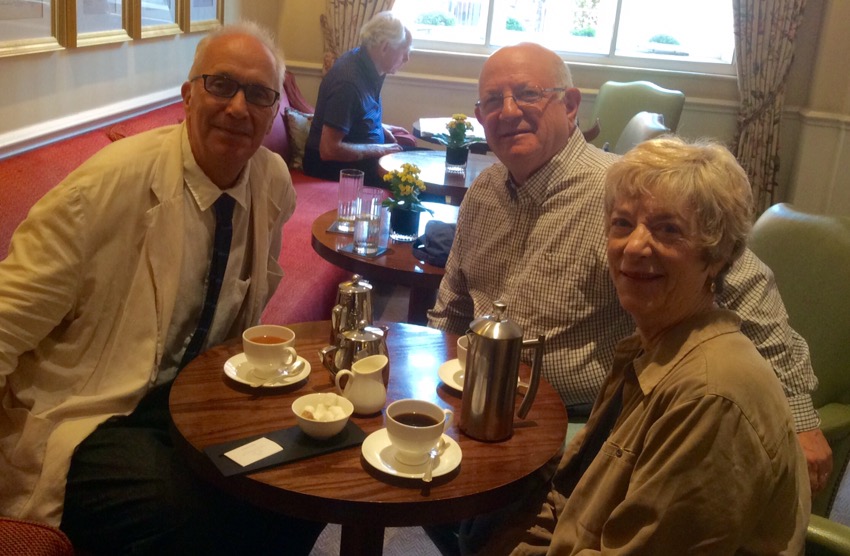
Oh, yes, and here’s a photo of the painting that John will be sending us when we return home.

Carol and I took a short walk around the fashionable Sloane Square area in which we are staying, ducking into air conditioned stores to avoid the heat of the hottest September in London in more than a century. Returned briefly to the Club to change, and then set off by tubes and bus to Tom’s house, where we visited with Tom, his younger daughter, Sophie, an architect, and her two children, Lucas and Eva. Except when talking to us, Tom and Sophie spoke only Hungarian to each other and to the children. I’ve had some trouble deciphering/hearing English accents, but that pales by comparison to how I do with Hungarian.
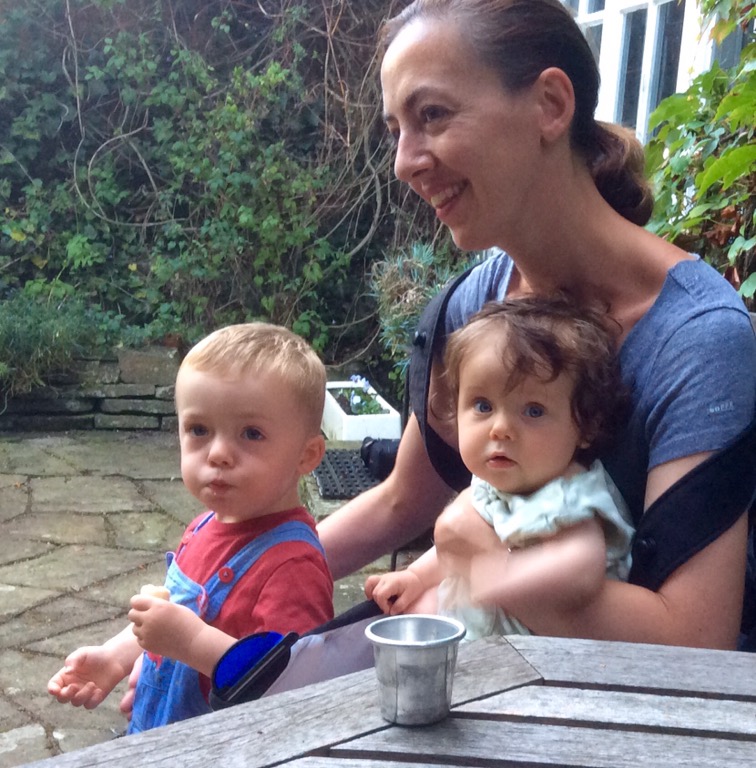 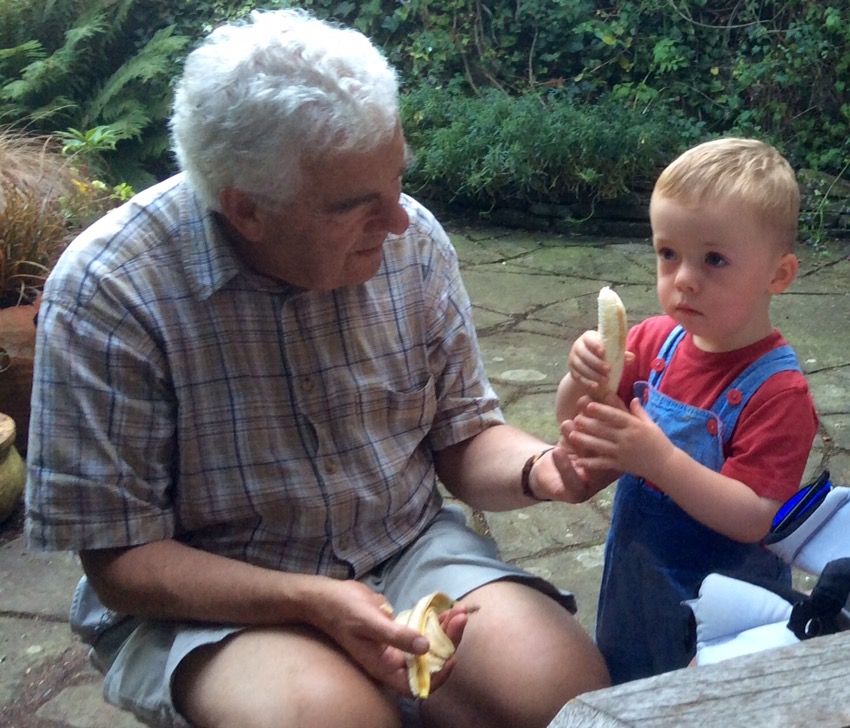
From Tom’s we took the tube, and got rather lost, going to visit Nick and Margaret Wilson in their flat in historic Lincoln’s Inn, which houses barrister offices, and some barristers. Nick and Margaret recently sold their house and are living in Lincoln’s Inn, where they will live until Nick retires at 75. Meanwhile, they are searching for a new house in the country, at which they will spend weekends and holidays. The Lincoln’s Inn building has no elevators, and there are 75 steps up to the Wilson’s flat. But we got even, because Nick had to come down to meet us when we got lost, and again to walk us to the tube station (at his insistence), when we left.
Nicholas (Nick) Wilson, was the other Oxford graduate who taught legal writing at Northwestern, along with Andrew Walker. Because Nick did not share Andrew’s passion for music or bridge, and because he stayed in Chicago only six months, rather than a year, and because he is a good deal more reserved than Andrew, we did not get to know Nick as well as we knew Andrew. But we certainly did get to know and like him in Chicago. We saw some of Nick in 1967-68, and again on another visit to London in 1985, when we had a lovely dinner at their house and a rousing game of Trivial Pursuit afterwards. Our friend, Steve Sugarman has remained in much closer and more regular touch with Nick, so I’ve stayed up to date on Nick and his family, through Steve.
Nick and Margaret are both barristers, and neither has done too badly. Before retiring from the court, Margaret was a Tribunal Judge. Nick (Lord Wilson) is one of twelve judges of the Supreme Court of the U.K., having been elevated in 2011, after a distinguished career as a barrister and trial and Court of Appeals Judge in the family law area. Here is what Wkipedia says about Nick:
Nicholas Allan Roy Wilson, Lord Wilson of Culworth PC (born 9 May 1945) is a British judge. On 26 May 2011, he became a Justice of the Supreme Court of the United Kingdom, having previously served as a Lord Justice of Appeal since 2005.
He was educated at Bryanston School and Worcester College, Oxford. Wilson was called to the Bar in 1967 (Inner Temple), and became a Queen’s Counsel in 1987. He was appointed a Recorder the same year. In 1993, he became a bencher and was appointed to the High Court, sitting in the Family Division, whereupon he was appointed a knight bachelor. He was appointed to the Court of Appeal in 2005, at which time he was also appointed to the Privy Council. On 26 May 2011, he joined the Supreme Court of the United Kingdom, succeeding Lord Saville of Newdigate and gaining the courtesy style “Lord Wilson of Culworth” for life.
The original plan had been to go out to eat with the Wilson’s, but Nick emailed this morning that Margaret had decided to “knock up some supper,” so that we should just come up to their flat. Amid drinks, and lively conversation that included a heavy dose of disbelief in Trump’s success and commentary about what an embarrassment he is to us, as well as similar discussions about Brexit, we ate the delicious dinner that Margaret had knocked up. We talked about my blog and, looking at yesterday’s post, Margaret immediately caught a misspelling of “chauffeured” in the title. I told her that I’d give her a shout out in this post, so here it is, Margaret. In all, it was a delightful three hours with Nick and Margaret, and we vowed not to wait so long for our next visit.
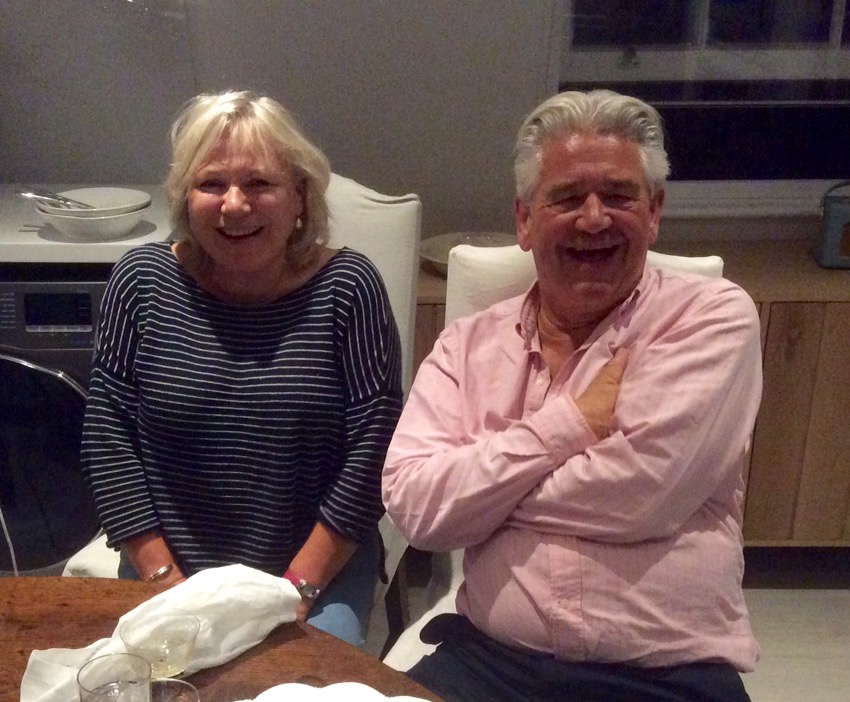
Here is Nick in somewhat less casual garb.
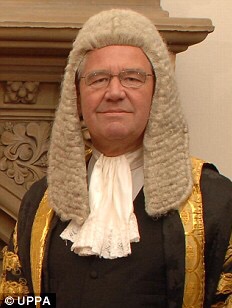
And here is a photo Margaret took of Carol and me.

In walking us to the Temple tube stop, Nick gave us a bit of history about the buildings we passed. Back home, blogged and retired. Cubs shut out Cardinals, magic number down to one (don’t want you to think that I’m not on top of the important things).
September 13
After coffee with Tom, we were picked up at Tom’s house this morning by our friends Pat and Steve Hemmens. As you will learn, one could hardly have chosen anyone better to be chauffeured around by.
Back in 1976, as a young partner at my law firm, I was fortunate to have a terrific secretary, Pat Kenny. And, as she was British, I benefited from the added prestige of having a secretary with a British accent answer my phone.
Pat was feisty, to understate it a bit, and had strong opinions on just about everything. She’d come into my office regularly to complain about the latest outrage at the firm, hinting that she wasn’t sure she could take this any longer. I would hear her out and tell her that I would be very sorry if she were to leave, but she had to do what was right for her. Eventually she would calm down, as among other things, she was fiercely loyal to me and would never have left me to fend for myself. Pat was much more than a secretary, but a friend of the whole family.
In 1980, she got married to Steve and moved back to London to begin her family of three boys, Daniel, Will and Rob. Pat and I remained in touch quite regularly through emails on everything from family to politics to the Cubs, who Pat has continued to follow. We saw Pat and Steve on a trip to London, when we travelled there with our daughters in 1985. The photo below is of Pat and, below that, Pat, Steve, their boys, Daniel and Will, and me with Jodi and Wendy (Carol evidently took the photo).
You will notice on the right a black car, which is Steve’s office, since he is a London taxi driver. They kindly offered to pick us up, transfer us to the club we are moving to and drive us around London and then out to the country. We rode in the Hemmens’ car, rather than Steve’s taxi, since, as Pat pointed out, the latter is not air conditioned.

And here is Pat, also in 1985, with a hint of Dan.
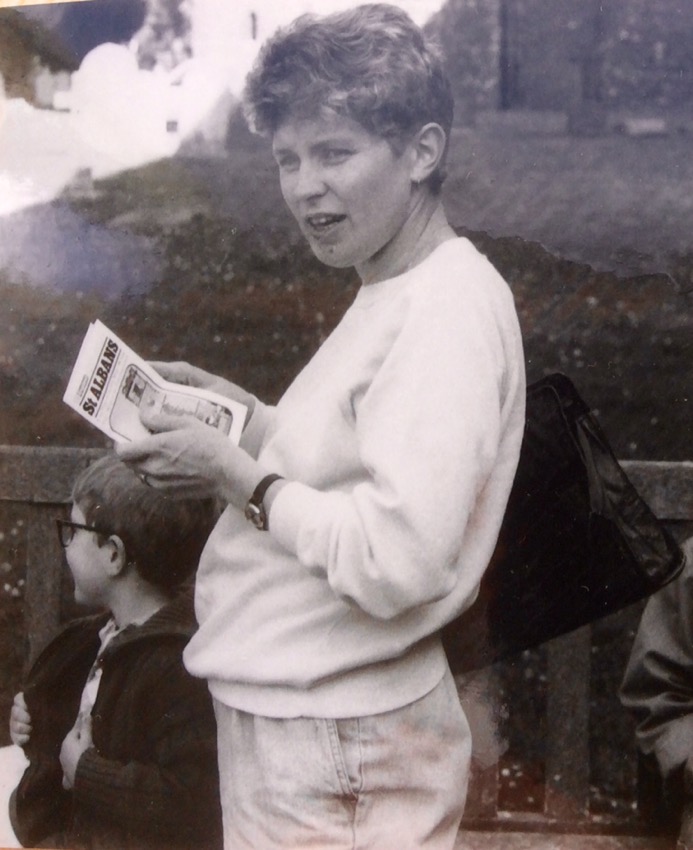
We rode a bit over an hour out to Henley on the Thames, where famous rowing races are held annually, and where two different Olympic regattas had been held. The day was sunny and lovely, if a bit warm. We walked for a while along the river.
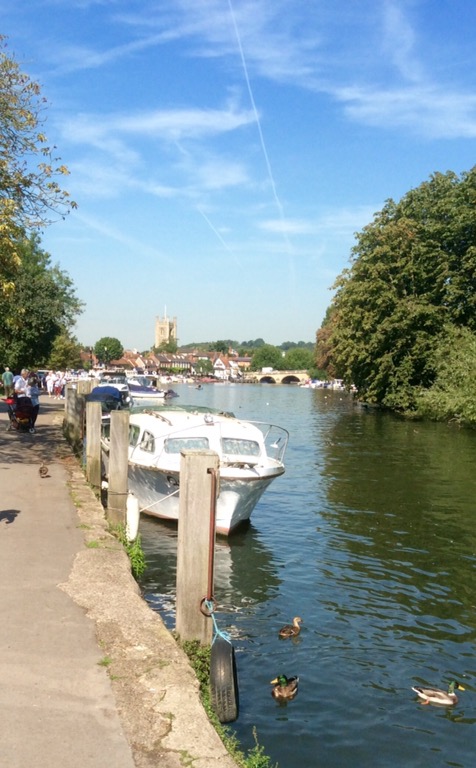 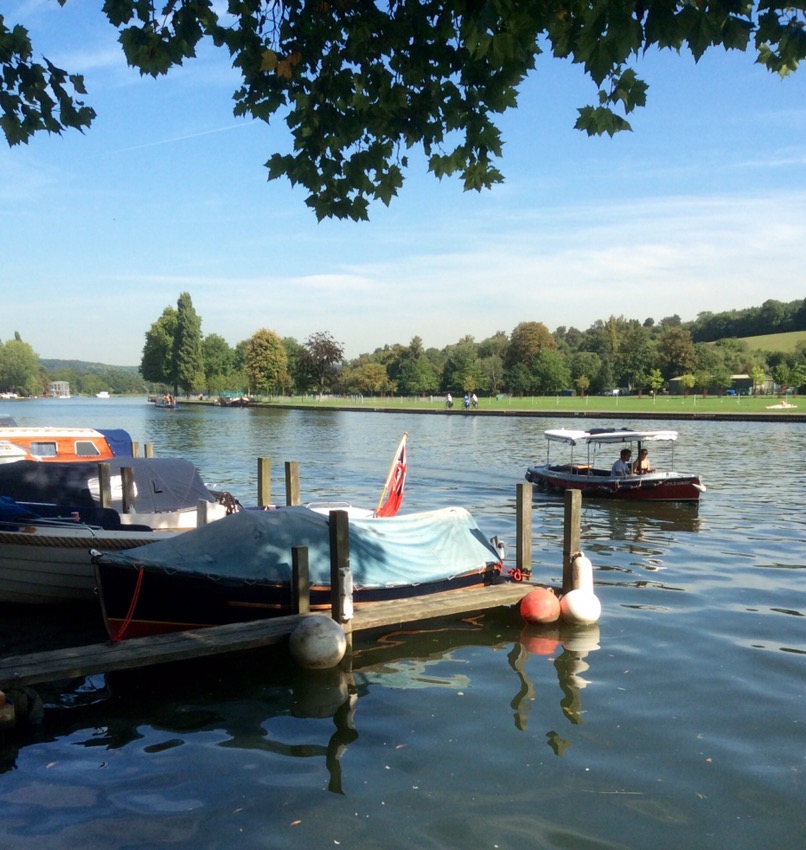 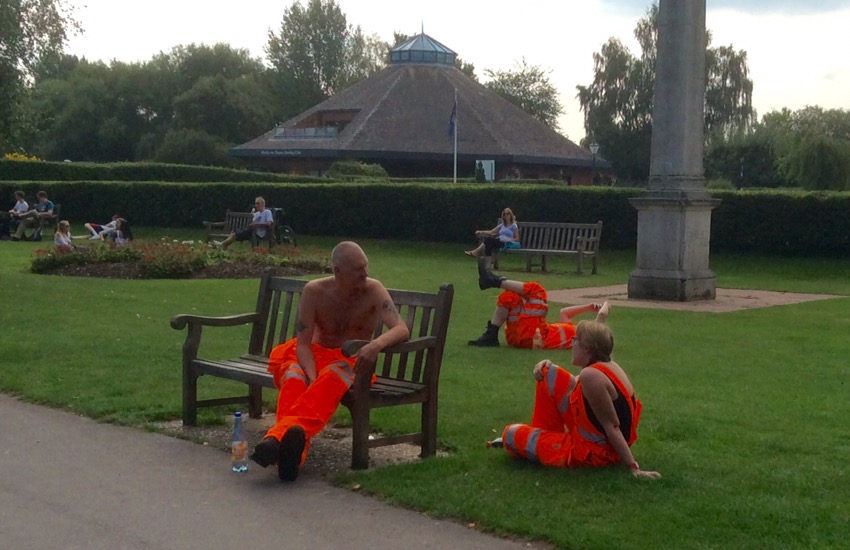
From there we drove about another 20 minutes to an area called Stoke Row, where Pat had booked lunch at a charming pub with excellent food, called The Crooked Billet.
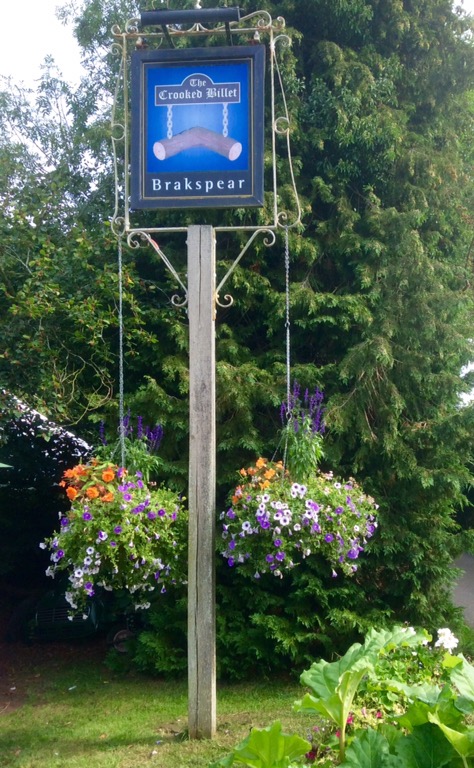 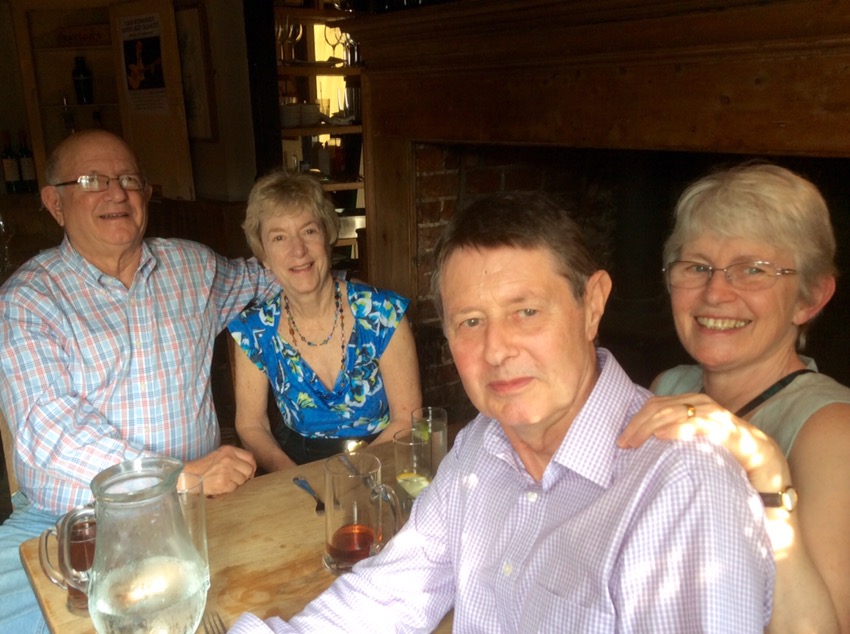
Over lunch, we had an opportunity to continue and expand our conversations, started in the car, about life at Sonnenschein, when Pat was my secretary, our families, the many volunteer activities Pat engages in and the impact (very significant) of Uber on the taxi business in London. Quite a wonderful couple hours.
The Crooked Billet is reputedly the inspiration and site for the poem The Highwayman by Alfred Noyes, one of Pat’s favorites when she was young. For those interested, here it is.
BY ALFRED NOYES
PART ONE
The wind was a torrent of darkness among the gusty trees.
The moon was a ghostly galleon tossed upon cloudy seas.
The road was a ribbon of moonlight over the purple moor,
And the highwayman came riding—
Riding—riding—
The highwayman came riding, up to the old inn-door.
He’d a French cocked-hat on his forehead, a bunch of lace at his chin,
A coat of the claret velvet, and breeches of brown doe-skin.
They fitted with never a wrinkle. His boots were up to the thigh.
And he rode with a jewelled twinkle,
His pistol butts a-twinkle,
His rapier hilt a-twinkle, under the jewelled sky.
Over the cobbles he clattered and clashed in the dark inn-yard.
He tapped with his whip on the shutters, but all was locked and barred.
He whistled a tune to the window, and who should be waiting there
But the landlord’s black-eyed daughter,
Bess, the landlord’s daughter,
Plaiting a dark red love-knot into her long black hair.
And dark in the dark old inn-yard a stable-wicket creaked
Where Tim the ostler listened. His face was white and peaked.
His eyes were hollows of madness, his hair like mouldy hay,
But he loved the landlord’s daughter,
The landlord’s red-lipped daughter.
Dumb as a dog he listened, and he heard the robber say—
“One kiss, my bonny sweetheart, I’m after a prize to-night,
But I shall be back with the yellow gold before the morning light;
Yet, if they press me sharply, and harry me through the day,
Then look for me by moonlight,
Watch for me by moonlight,
I’ll come to thee by moonlight, though hell should bar the way.”
He rose upright in the stirrups. He scarce could reach her hand,
But she loosened her hair in the casement. His face burnt like a brand
As the black cascade of perfume came tumbling over his breast;
And he kissed its waves in the moonlight,
(O, sweet black waves in the moonlight!)
Then he tugged at his rein in the moonlight, and galloped away to the west.
PART TWO
He did not come in the dawning. He did not come at noon;
And out of the tawny sunset, before the rise of the moon,
When the road was a gypsy’s ribbon, looping the purple moor,
A red-coat troop came marching—
Marching—marching—
King George’s men came marching, up to the old inn-door.
They said no word to the landlord. They drank his ale instead.
But they gagged his daughter, and bound her, to the foot of her narrow bed.
Two of them knelt at her casement, with muskets at their side!
There was death at every window;
And hell at one dark window;
For Bess could see, through her casement, the road that he would ride.
They had tied her up to attention, with many a sniggering jest.
They had bound a musket beside her, with the muzzle beneath her breast!
“Now, keep good watch!” and they kissed her. She heard the doomed man say—
Look for me by moonlight;
Watch for me by moonlight;
I’ll come to thee by moonlight, though hell should bar the way!
She twisted her hands behind her; but all the knots held good!
She writhed her hands till her fingers were wet with sweat or blood!
They stretched and strained in the darkness, and the hours crawled by like years
Till, now, on the stroke of midnight,
Cold, on the stroke of midnight,
The tip of one finger touched it! The trigger at least was hers!
The tip of one finger touched it. She strove no more for the rest.
Up, she stood up to attention, with the muzzle beneath her breast.
She would not risk their hearing; she would not strive again;
For the road lay bare in the moonlight;
Blank and bare in the moonlight;
And the blood of her veins, in the moonlight, throbbed to her love’s refrain.
Tlot-tlot; tlot-tlot! Had they heard it? The horsehoofs ringing clear;
Tlot-tlot; tlot-tlot, in the distance? Were they deaf that they did not hear?
Down the ribbon of moonlight, over the brow of the hill,
The highwayman came riding—
Riding—riding—
The red coats looked to their priming! She stood up, straight and still.
Tlot-tlot, in the frosty silence! Tlot-tlot, in the echoing night!
Nearer he came and nearer. Her face was like a light.
Her eyes grew wide for a moment; she drew one last deep breath,
Then her finger moved in the moonlight,
Her musket shattered the moonlight,
Shattered her breast in the moonlight and warned him—with her death.
He turned. He spurred to the west; he did not know who stood
Bowed, with her head o’er the musket, drenched with her own blood!
Not till the dawn he heard it, and his face grew grey to hear
How Bess, the landlord’s daughter,
The landlord’s black-eyed daughter,
Had watched for her love in the moonlight, and died in the darkness there.
Back, he spurred like a madman, shrieking a curse to the sky,
With the white road smoking behind him and his rapier brandished high.
Blood red were his spurs in the golden noon; wine-red was his velvet coat;
When they shot him down on the highway,
Down like a dog on the highway,
And he lay in his blood on the highway, with a bunch of lace at his throat.
. . .
And still of a winter’s night, they say, when the wind is in the trees,
When the moon is a ghostly galleon tossed upon cloudy seas,
When the road is a ribbon of moonlight over the purple moor,
A highwayman comes riding—
Riding—riding—
A highwayman comes riding, up to the old inn-door.
Over the cobbles he clatters and clangs in the dark inn-yard.
He taps with his whip on the shutters, but all is locked and barred.
He whistles a tune to the window, and who should be waiting there
But the landlord’s black-eyed daughter,
Bess, the landlord’s daughter,
Plaiting a dark red love-knot into her long black hair
Later in the afternoon, Pat and Steve drive us back to London and drop us at The Sloane Club in Chelsea. We are able to gain access to the Club because of Sarah Callander Beckett, a good friend of our travel agent (who did not work on this trip), Jean Zunkel. Sarah kindly arranged this, though we’ve never met her.
After checking in and unpacking, Carol and I take the tube to meet Tom and Judith at the Gielgud theater to see The Curious Incident of the Dog in the Night. Carol and I had seen the play in New York, and absolutely loved it. We were very keen to take Tom and Judith, and anxious to see it again ourselves. All four of us were enthusiastic about the show.
After the show, we had dinner at an Indian restaurant near the theater, then took the tube back to the Sloane Club to retire.
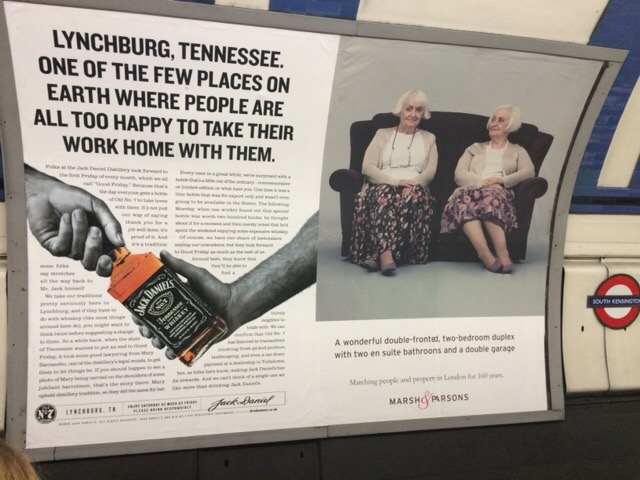
September 12
Morning coffee with Tom at his house. We wait for a call Tom is expecting from a travel agent we had put him in touch with in Dehli, Shonali Datta, who planned two wonderful trips for us in India. Tom and Judith were intending to go (back, as they’d been there before) to India and had been put in touch with another travel agent who had put together a trip that had ignored their explicit instructions to the agent. They had decided they just would not go, but visit Sicily, instead. When we sang Shonali’s praise, Tom decided to give her a try. And I think that we may have a match. Fun to be able to facilitate these kinds of connections.
It’s so nice to be back in London. The feel and scale of the place is so comfortable to us. Though I’m sure there has been much change in Highgate since the 1960’s, and Tom has pointed some out to us, it still feels the same as the London we knew and came to enjoy so much. We have not been to Central London yet, though we’ll get there later today, and that may have changed more. Note: we did get there, and the feel really hasn’t changed.
Here are a few London shots, in the tube station and outside, one of which shows the Starbuckization of London pubs.
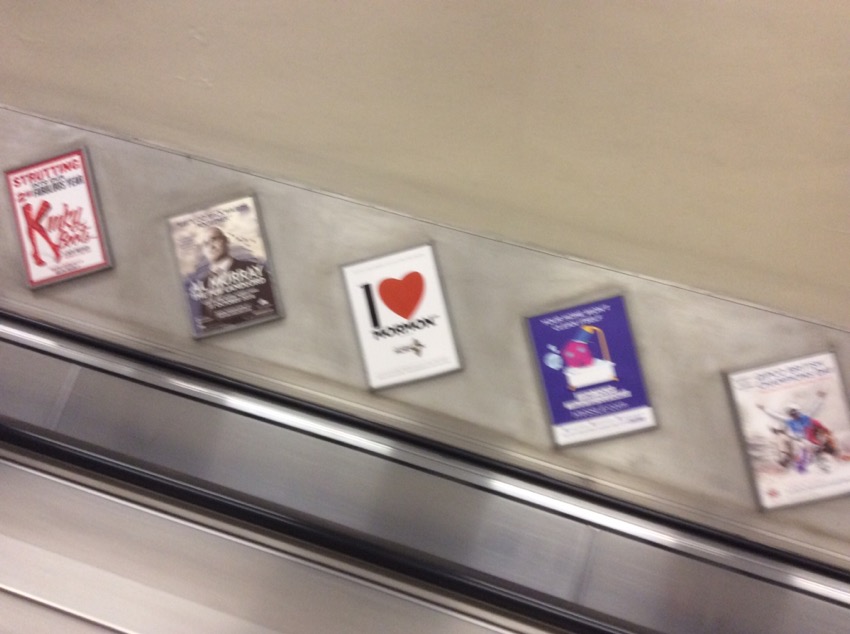  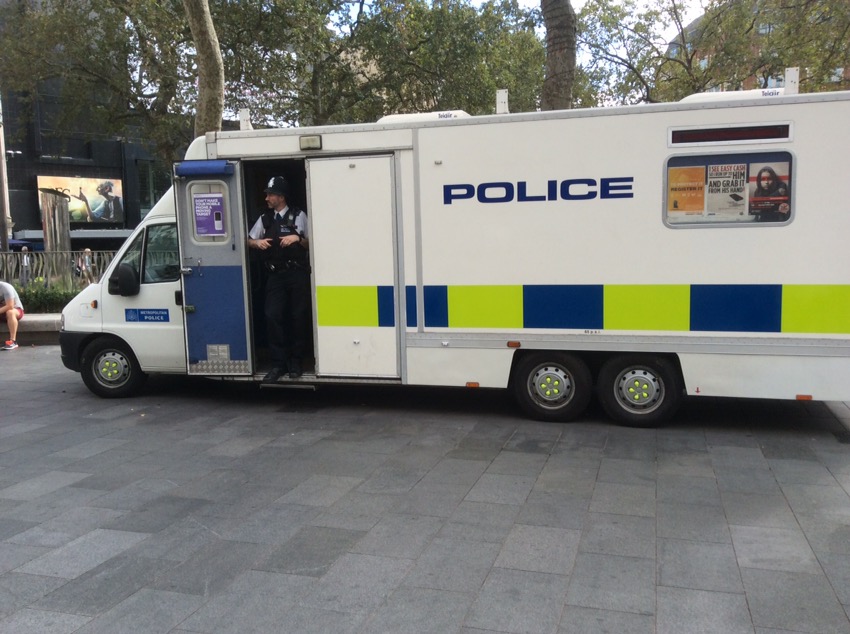 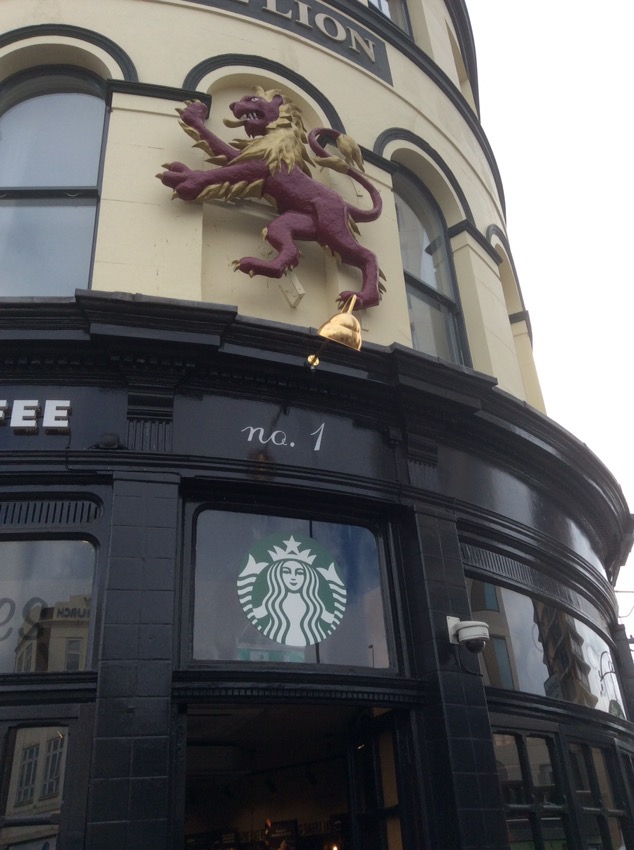
Carol and I separated from Tom, who was running some errands, and had a very nice lunch (Carol said it might have been the best quiche she’d ever had) at a restaurant on Picadilly that specialized in sweets and ice cream.
We then met Tom and Judith at the Royal Academy and saw a wonderful David Hockney show entitled “Eighty-two portraits and one still life,” which he painted in his Los Angeles studio over a period of only a couple years. The portraits were great and the audio tape contributed to our appreciation of the show. If it travels to the US to a city you’re in (I would imagine it will go at least to LA), see it.
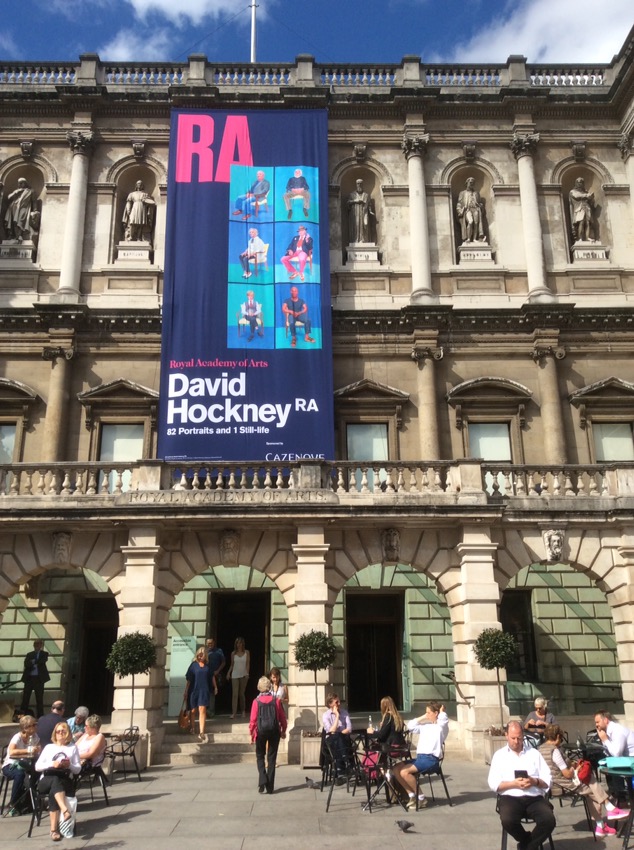
The four of us then returned to the restaurant just to make sure that the ice cream was as good as the lunch that Carol and I had eaten. It was.
We then happened upon a wonderful London restaurant, where we had a fine dinner.
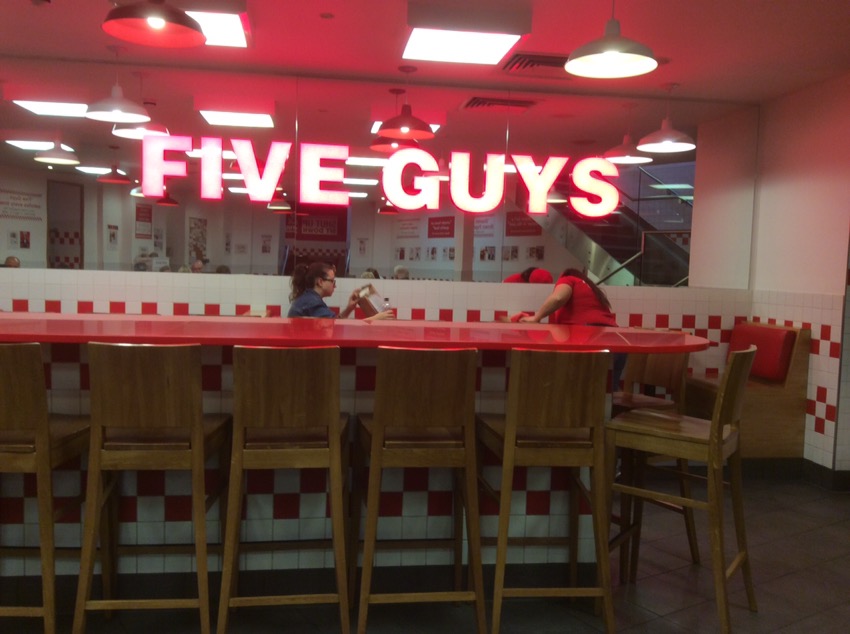
It was our pleasure to introduce Tom and Judith to this fine establishment.
We went to the theater to see The Entertainer, starring Kenneth Branagh, a very hot London actor. It sucked. The other three would have been slightly more generous, or tactful, but, trust me, it sucked. That’s a risk that you take, though, when you go to the theater. My only regret is that I was unable to convince the group to leave after one act.
We returned by tube and bus to Tom’s house, blogged and went to bed.
September 11
Spent the morning talking with Tom, first in his kitchen then, taking advantage of the glorious weather, outside in his garden. We picked up Judith around noon. Judith, a longtime friend and close companion of Tom is a graphic artist and works in publishing. Though we’d met Judith before, we got to know and like her when she and Tom visited us in Chicago last year. We drove to a lovely Italian restaurant, La Collina, where we ate outside and had a wonderful meal and good conversation.
Here’s the outside of Chez Handler, and our group at lunch.
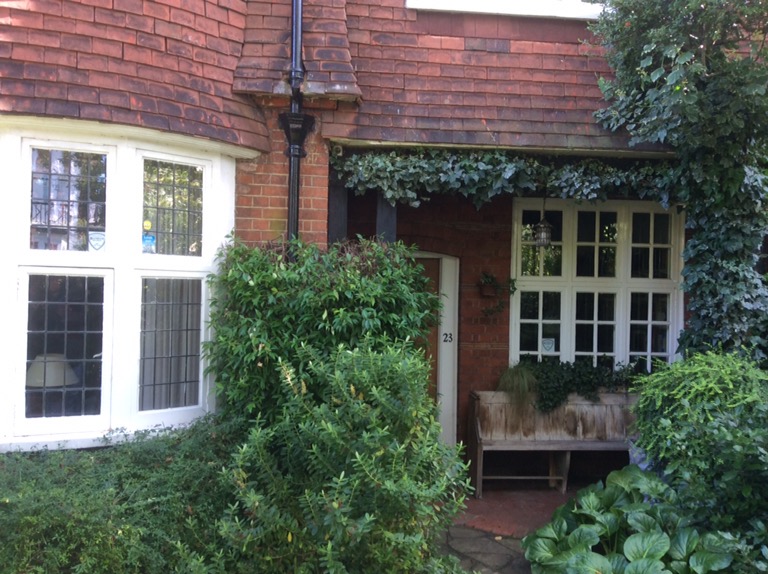 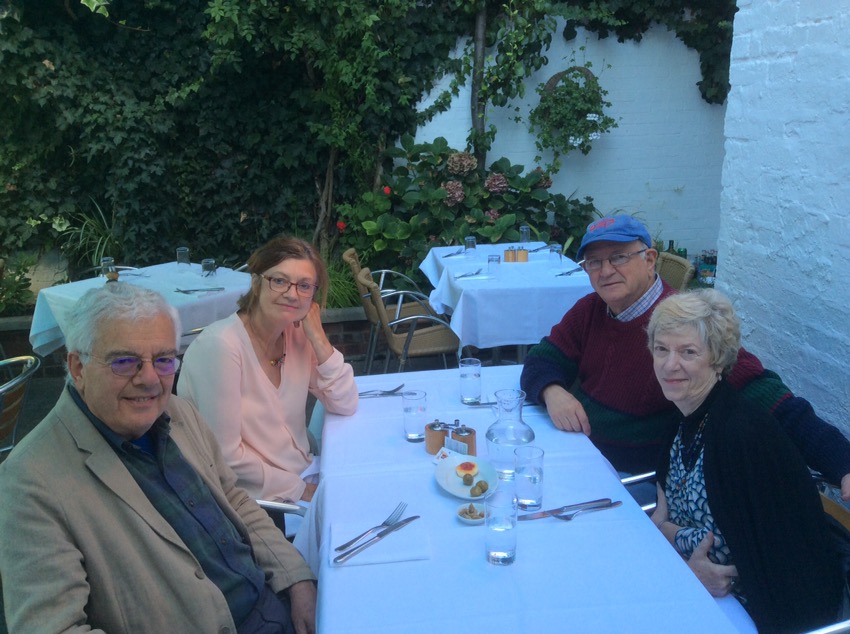
After lunch, Carol, Tom and I went on to visit with Rebecca, Tom’s older daughter. We last saw Rebecca in 1985 (photos in preceding blog post). Since then, she’s become a solicitor, married and developed into the lovely woman we’d anticipate as a daughter of Tom’s. We spent a delightful couple hours talking about her work as a government lawyer, her husband, Charlie, and a host of other topics.
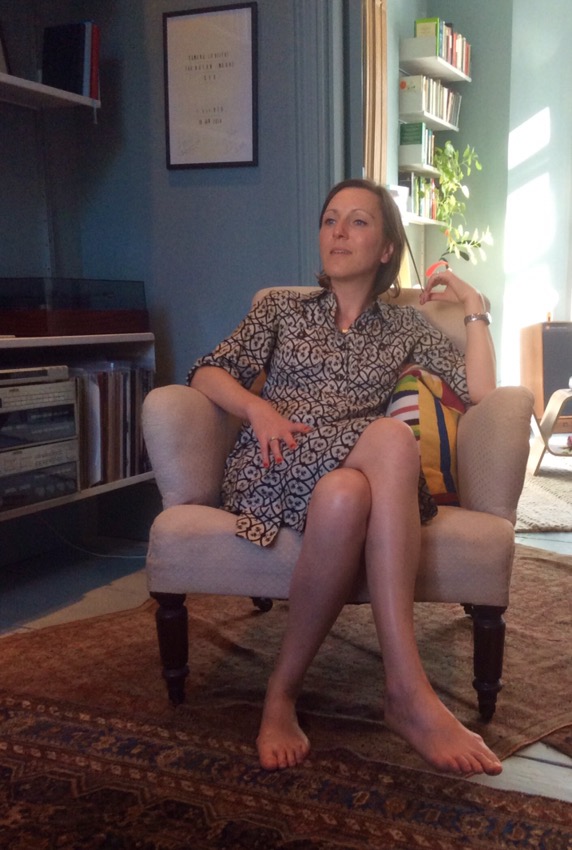
We returned to Tom’s house, rested for a while and then Tom drove us to The Bull & Last pub, where Andrew and Hilary Walker had booked a table for the four of us for dinner.
I met and got to know Andrew Walker a year before we went to London, because Andrew was a legal writing instructor at Northwestern University School of Law, and his office my senior year was close to our law review office. At the time, Northwestern hired two Oxford graduates annually to help with legal writing. Andrew had a very outgoing personality, rather unusual for a Brit, and as we shared an interest in music and bridge, Carol and I became quite good friends with Andrew in Chicago.
Back in London, we saw Andrew quite regularly, often around musical events of one sort or another. Andrew is very knowledgable about music, knows who has recorded what piece and which is the best recording. In Chicago, he sang in the Chicago Symphony chorus and was an extra for the Lyric Opera. He was very keen on going to performances, too, so I must tell of one incident.
Shortly after arriving in London in 1967, I managed to dislocate my shoulder and decided to grow a beard, as shaving was difficult. With my arm in a sling, I looked rather grubby. One day I found myself near the Covent Garden Opera House. I’d read that the performances of Figaro were sold out, but, I figured, what the hell, I’d stop by to ask. Of course, I was told that there were no tickets, but when I expressed disappointment, the woman in the box office took pity on this poor, grubby American, went in back and produced two tickets for me. I made it a point to go back to thank the woman after the performance, and Dorothy and her husband, Sid, became friends of ours.
Tickets to plays and concerts were readily available in London, but tickets to opera and ballet were in huge demand and, in an example of English fairness and decorum, were parceled out in a lottery by mail and a certain number were made available in person for which people would queue up for as much as 36 hours. But, if Carol and I were away when a new set of tickets became available, we would return home to a note from Dorothy saying that as she didn’t know what we’d like to see, she had put aside two tickets to everything, so would we please let her know which we’d like. When Andrew heard about this, he became infuriated, saying, “it’s just like you damn Yanks, you come over here and figure out how to beat the system.”
Many years later, in the mid-1990’s, on leave from the large English firm of solicitors, Lovells, of which he became the senior partner, Andrew spent a few months in Chicago at Northwestern School of Law, which I think I was a bit helpful in facilitating. By then, he was married to Hilary, equally as outgoing as Andrew, and Carol and I spent some lovely evenings with them in Chicago. Before heading back to England, Andrew and Hilary decided to take a trip out East driving around to see fall colors and visit various spots, planned by Andrew in his typical, meticulous manner. They invited Carol and me to join them for as much of it as we wanted, and we spent a delightful five or six days traveling with them.
Then eight or nine years ago, they made the serious mistake of writing in the fall to say that they knew that we planned trips far in advance, so they wanted to invite us to come visit the summer after next at a time of our choosing to spend time with them in London and in their cottage in Scotland. Of course, we accepted and had a fabulous ten days with them in the summer of 2009, including an unforgettable day of opera at Glyndebourne, where one dresses formally for opera, as well as an opera at Covent Garden in London. Andrew and Hilary could not have been more gracious hosts, and we’ll never be able to match them if they allow us to reciprocate, as we would like to.
Hilary and Andrew lived in Hong Kong for almost five years, where Andrew practiced with Lovell. Hilary is a student of art history and now paints herself. They have travelled very extensively throughout the world.
We had a wonderful evening, enjoyed an excellent dinner and caught up on recent years and reminisced about days gone by. Here are photos of Andrew with us in formal dress in 2009 at Glyndebourne (Hilary must have taken the photo) and of all of us tonight.
 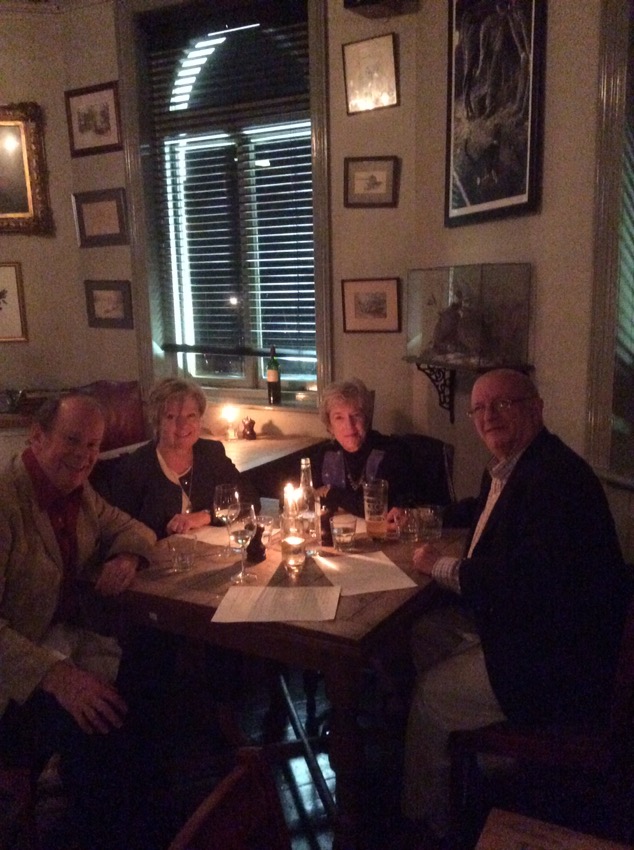
As you can see, we are off to a good start on achieving our goal of reconnecting with old friends here. Apologies if repeated recitations of our great conversations seems a bit boring or repetitive to you. I assure you that they have been anything but that for us.
|
|





































